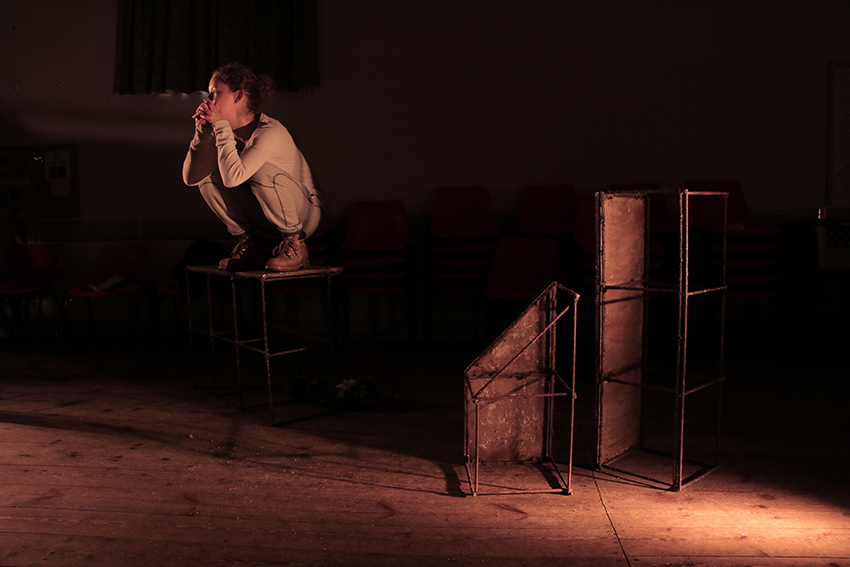 Directed by Nel Crouch, and produced in association with Bucket Club, The Long Trick is an hour-long three-hander set in Cornwall. It tells the story of Tristan, who lives with his young daughter Kelsey on a boat moored on the Helford River. Tristan makes a somewhat precarious living by stealing from all the local second homes that lie unoccupied for months while their wealthy owners are ‘up North’ in places like Kent or Surrey. He is careful to take anonymous items such as iPads and the like; if missed, they will not be traceable. Though rather small beer, these wealth-redistribution activities have brought him near-legendary status, and this draws an interesting outsider into his secret world. She is Gale, and she becomes Kelsey’s home tutor. Gale has a keen interest in supporting Tristan’s house-breaking activities, and a keen interest in Tristan, too. Tensions develop when an opportunity arises for him to steal something of real value, something unique and precious. Gale sees this as a chance to do something spectacular, something that will bring publicity to their cause; Tristan is reluctant to do something that could put his hitherto quiet life in jeopardy.
Directed by Nel Crouch, and produced in association with Bucket Club, The Long Trick is an hour-long three-hander set in Cornwall. It tells the story of Tristan, who lives with his young daughter Kelsey on a boat moored on the Helford River. Tristan makes a somewhat precarious living by stealing from all the local second homes that lie unoccupied for months while their wealthy owners are ‘up North’ in places like Kent or Surrey. He is careful to take anonymous items such as iPads and the like; if missed, they will not be traceable. Though rather small beer, these wealth-redistribution activities have brought him near-legendary status, and this draws an interesting outsider into his secret world. She is Gale, and she becomes Kelsey’s home tutor. Gale has a keen interest in supporting Tristan’s house-breaking activities, and a keen interest in Tristan, too. Tensions develop when an opportunity arises for him to steal something of real value, something unique and precious. Gale sees this as a chance to do something spectacular, something that will bring publicity to their cause; Tristan is reluctant to do something that could put his hitherto quiet life in jeopardy.
Rebecca Jane Wood’s simple set consists of portable sections of open metal framework that can serve to represent whatever a scene requires: seating in Tristan’s boat, barstools in a pub, or even loudspeakers at a concert. The flexibility this offers allows the narrative to flow uninterrupted by scene changes. Atmosphere is enhanced by Aaron May’s sound design; the play opens to the evocative distant roar of breakers on a Cornish shore.
In addition to conventional dialogue, the cast deliver the story through spoken narrative, rhyming verse and song. In the earlier part of the show there is relatively little dialogue, and this means that it takes a rather too long for the characters’ different personalities and inter-relationships to emerge. The songs are beautifully sung, the verse is pleasingly lyrical, and the passages of spoken narrative are often witty, but both characterisation and mood tend to be rather low key. For example, Kelsey briefly reveals an eclectic taste for music, but apart from a very brief scene at a local festival this aspect of her character is not explored.
Martha Seignior is an endearing Kelsey, but her fears for her father and her frustrations with life on the river are rather underplayed. Darcy Vanhinsbergh’s Tristan is a convincing portrayal of a proud Cornishman who feels his criminal activities are entirely defensible, but is he driven by a Robin Hood-like sense of righteous anger, or is his motive a less noble desire to avoid doing a legitimate nine-to-five job? Did his wife leave him because he’s a criminal, or because he’s a layabout? Such questions remain unanswered. Gale’s character is more clearly defined, and Jessica Murrain gives her an intriguing touch of exoticism; she speaks French, she’s a vegan, and her motives are very clearly political. She brings both a sense of the wider world and a touch of danger that contrasts well with Tristan’s quieter ordinariness. In the latter half of the play there are longer interchanges between the characters, and in consequence they become more three-dimensional. A surprising turn of events finds Tristan at odds both with Gale and with his daughter, and these are dramatic confrontations that allow the cast to explore a wider emotional range. True to the rather gentle way this play handles the controversial issue of second homes, all conflicts are quietly resolved in the end.
Marietta Kirkbride has taken an oblique and inventive look at so-called ‘gentrification’, and has created a very engaging and often amusing play. But the damage done to local cultures by the buying of second homes is an incendiary issue – sometimes literally so, and I would have welcomed a greater sense of anger; there should be more bite. Nevertheless, The Long Trick is a cleverly constructed play with a very satisfying twist in its tail; it has considerable charm and is well worth seeing. ★★★☆☆ Mike Whitton 1st March 2017

